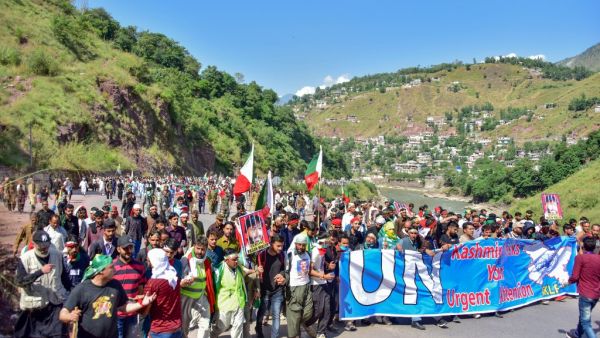Pakistani authorities Sunday evening halted hundreds of Kashmiris belonging to a pro-independence group from approaching the Line of Control (LoC), the de facto border that divides disputed Kashmir between Pakistan and Indian.
The protesters gathered on Friday in Muzaffarabad, the capital of Pakistani-administered Azad Jammu and Kashmir, and by Sunday the "Freedom March" had reached the Jiskool area, located some 13 kilometers (8 miles) from the Line of Control.
There the local administration blocked the Muzaffarabad-Srinagar highway by placing containers and barbed wires, stopping the marchers from going forward.
The march was organized by the Pakistan-administered Azad Kashmir chapter of the Jammu and Kashmir Liberation Front (JKLF), a group led by incarcerated pro-independence leader Yasin Malik.
"The administration has blocked the road and not allowed us toward the LoC," Rafiq Dar, the front’s spokesman, told Anadolu Agency over the phone
According to local media, the local administration told the marchers that they would not allow them any further as Indian forces could target them.
Pakistani Prime Minister Imran Khan on Saturday warned against any “emotional” attempt by the people to cross the Line of Control, as any such attempt could hurt Kashmiris’ struggle.
Last month already frosty relations between Pakistan and India reached a new low after India scrapped special provisions allowing the state of Jammu and Kashmir semi-autonomy.
{"preview_thumbnail":"https://cdn.flowplayer.com/6684a05f-6468-4ecd-87d5-a748773282a3/i/v-i-f…","video_id":"fa025da9-44b3-47ef-b999-ec504c66d59c","player_id":"8ca46225-42a2-4245-9c20-7850ae937431","provider":"flowplayer","video":"Hong Kong Protesters Ignore Face Mask Ban, Continue Mass Rallies"}
The state has been under a near-complete lockdown since Aug. 5.
Rights groups including Human Rights Watch and Amnesty International have repeatedly called on India to lift restrictions and release political detainees.
Indian authorities claim that daytime restrictions have been lifted in 93% of the region, a claim Anadolu Agency could not verify independently.
From 1954 until Aug. 5, 2019, Jammu and Kashmir enjoyed special status under the Indian Constitution, which allowed it to enact its own laws.
The provisions also barred outsiders from settling in or owning land in the territory.
India and Pakistan both hold Kashmir in part and claim it in full. China also controls part of the contested region, but it is India and Pakistan who have fought two wars over Kashmir.
This article has been adapted from its original source.








